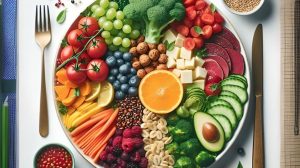
When you think of a healthy and balanced diet, what comes to our mind? Fruits, vegetables, lean proteins, and whole grains?
Actually this is correct, and it is not a rocket science as well. A balanced diet is more than just a concept; it’s an important part of leading a healthy life. This blog post examines the basics of a balanced diet, its positive effects on the human body, and the long-term advantages of sticking to it.
Understanding a Balanced Diet
A balanced diet provides the body with essential nutrients: There are two types of nutrients, Macro and Micro nutrients. Those are carbohydrates, proteins, fats, vitamins, and minerals. These nutrients are vital for the proper functioning of our body. Carbohydrates are the primary energy source, proteins build and repair tissues, fats offer long-term energy storage and insulation, while vitamins and minerals support various bodily functions, including immune response, bone health, and fluid balance.
Basic Tips for Maintaining a Balanced Diet
- Variety is Key to remain consistent: Eating a range of different foods ensures you’re getting a broad spectrum of nutrients. Avoid monotony in your meals.
- Portion Control: Overeating healthy foods can be just as detrimental as junk foods. Learn the right portion sizes and stick to them. We need to measure the calories intake based on what we are eating.
- Include Plenty of Fruits and Vegetables: They are high in vitamins, minerals, and fiber while being low in calories.
- Choose Whole Grains: Whole grains like brown rice, oats, and whole-wheat products have more fiber and nutrients than refined grains. Fiber makes your gut health happy and strong.
- Opt for Lean Proteins: Fish, poultry, beans, and legumes are excellent sources of protein without the excessive fats found in red meat. Those who opt for Veg diet, they can go ahead with Whey, Soy, nuts and pulse. But in calculated amount.
- Limit Sugars and Salt: High sugar and salt intake can lead to chronic conditions like hypertension, diabetes, and heart disease.
- Stay Hydrated: Drink plenty of water throughout the day. It’s essential for almost every function in your body. Also don’t over drink it as your body needs certain amount of water at different situations.
Positive Effects of a Balanced Diet on the Body
- Energy Levels: Consuming a balanced diet ensures a steady supply of energy throughout the day. Carbohydrates and fats provide immediate and sustained energy, respectively, while proteins assist in tissue repair and muscle growth.
- Immune Function: A diet rich in vitamins and minerals, particularly vitamins A, C, and E, zinc, and selenium, boosts your immune system. This helps your body fend off illnesses more effectively.
- Digestive Health: High-fiber foods like fruits, vegetables, and whole grains aid in digestion, preventing constipation and promoting a healthy gut microbiome.
- Mental Well-being: Nutrients like omega-3 fatty acids, found in fish, walnut and seeds, play a crucial role in brain health. Studies suggest a balanced diet can improve mood and reduce the risk of mental health disorders such as depression and anxiety.
Biological Reasons for Long-term Benefits
- Heart Health: A balanced diet low in saturated fats and high in fiber can help reduce cholesterol levels, lower blood pressure, and decrease the risk of cardiovascular diseases. High fiber from whole grains and fruits can reduce LDL cholesterol, while healthy fats like omega-3s decrease triglycerides.
- Bone Strength: Calcium and vitamin D, found in dairy products and certain fish, are essential for maintaining strong bones. These nutrients help prevent osteoporosis and other bone-related conditions in the long term.
- Weight Management: Consuming a diet rich in whole foods and low in processed foods helps maintain a healthy weight. This reduces the risk of obesity-related conditions such as type 2 diabetes, hypertension, and heart disease.
- Longevity: Long-term adherence to a balanced diet is associated with increased lifespan. Nutrients from a balanced diet help combat oxidative stress and inflammation, two key factors in the aging process.
Additional Tips for a Balanced Diet
- Healthy Snacking: Opt for nuts, seeds, fruits, or yogurt instead of chips or cookies. Healthy snacks can provide nutrients and energy between meals.
- Mindful Eating: Pay attention to what and how much you eat. Eat slowly and savor your food, this helps with better digestion and prevents overeating.
- Cooking at Home: Preparing meals at home allows you to control the ingredients and portions. It also ensures you’re using fresh and healthy ingredients.
Conclusion
Maintaining a balanced diet is a pioneer of having a good health. It fuels your body, supports bodily functions, enhances mental well-being, and reduces the risk of chronic diseases. Embracing a balanced diet today paves the way for a healthier and more vibrant tomorrow. Remember, it’s not about perfection but about making healthier choices consistently over time. Start small, be consistent, and enjoy the journey to better health!
Adding a little color to this: If you imagine a plate filled with vibrant greens, juicy reds, and hearty grains, picture how each bite is nourishing your body and mind, one meal at a time. You’ve got this!
The best part about starting to eat balanced is that each step builds on the next. A breakfast full of whole grains sets you up for a productive day; a lunch packed with lean proteins keeps you going, and a dinner rich in vegetables and healthy fats rounds it all off.
Thank you for being a part of this learning journey. Please share if you like it !
Gyaanology Team
Invest in your health now and enjoy the benefits for years to come.
Leave a Reply